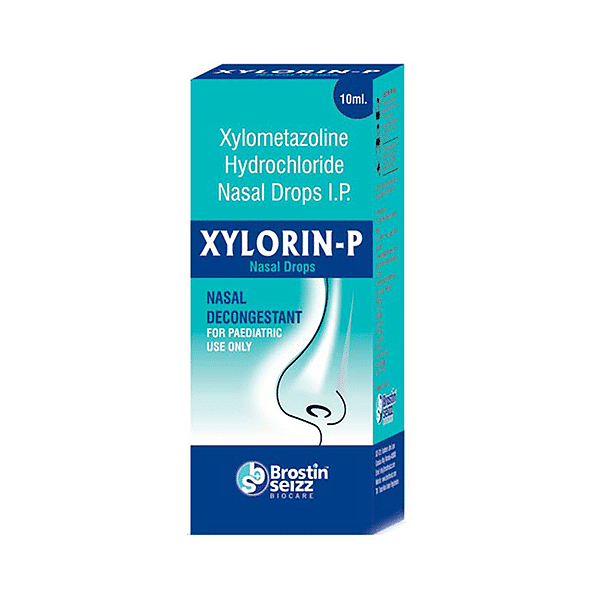
Xylovin Nasal Drops
Manufacturer
Mandar Pharmaceuticals Pvt Ltd
Salt Composition
Xylometazoline (0.05% w/v)
Key Information
Short Description
Xylovin Nasal Drops is a medicine that helps clear and soothes the blocked nose, thereby relieving nasal congestion due to common cold, hay fever, or other respiratory allergies in children.
Dosage Form
Nasal Drops
Introduction
Xylovin Nasal Drops is a nasal decongestant that helps in opening up the nasal passages by reducing excessive nasal secretions and also reducing the swelling in the blood vessels in the inner surface of the nose. This provides temporary relief from congestion or stuffiness in the nose.
Directions for Use
Do check the medicine’s ‘expiry’ date before using it. Do not give more than the recommended dose as it can lead to side effects. Do not use it more than 3 times a day. Prolonged use and abrupt stoppage of Xylovin Nasal Drops can lead to complications. Follow the doctor’s prescription carefully. One container of Xylovin Nasal Drops should only be used only by one person. This is to avoid spreading infection from one person to another. Do not share the same medicine with others. Encourage your child to inhale the steam as it may help relieve symptoms.
Safety Information
Side Effects
No common side effects listed.
Interacting Medicines
Acyclovir Famciclovir Furazolidone Ganciclovir
How it works
Xylovin Nasal Drops is a nasal decongestant. It helps in opening up the nasal passages by reducing excessive nasal secretions and also reducing the swelling in the blood vessels in the inner surface of the nose. This provides temporary relief from congestion or stuffiness in the nose.
Quick Tips
Do check the medicine’s ‘expiry’ date before using it. Do not give more than the recommended dose as it can lead to side effects. Do not use it more than 3 times a day. Prolonged use and abrupt stoppage of Xylovin Nasal Drops can lead to complications. Follow the doctor’s prescription carefully. One container of Xylovin Nasal Drops should only be used only by one person. This is to avoid spreading infection from one person to another. Do not share the same medicine with others. Encourage your child to inhale the steam as it may help relieve symptoms.
Related Medicines

Xylorin P 0.05% Nasal Drops

Sinoryl Pead 0.05% Nasal Drops

Wiz P 0.05% Nasal Drops

Etolin -P 0.05% Nasal Drops

Zyris-P Nasal Spray

Optocold P 0.05% Nasal Drops

Xylover P 0.05% Nasal Drops

Nfree-X Kid 0.05% Nasal Drop/Spray

Xylotone 0.05% Nasal Drops

Siomet P Nasal Drops
Frequently asked questions
Can I give Xylovin Nasal Drops to my child for more than 2 weeks if he has on and off nasal congestion?
No, it is recommended not to give Xylovin Nasal Drops to your child for more than 10 consecutive days as it may lead to complications such as atrophic rhinitis. Additionally, it is essential to follow the prescribed dosing schedule to avoid rebound congestion. It is advised to consult with your child's doctor for guidance on the appropriate duration of treatment.
What if I give too much of Xylovin Nasal Drops to my child by mistake?
An overdose of Xylovin Nasal Drops can cause severe symptoms such as dizziness, perspiration, lowered body temperature, headache, bradycardia, hypertension, respiratory depression, coma, and convulsions. Children are more sensitive to toxicity than adults, so it is crucial to seek immediate medical attention from your child's doctor if an overdose occurs.
How to use Xylovin Nasal Drops in my child?
Before administering Xylovin Nasal Drops, ask your child to clear their nose by blowing gently. Have your child lie down and look up. Tilt their head back as far as comfortable, or if lying on a bed, keep their head over the side. Open the cap of the medicine container and apply the medicine into each nostril without touching the nozzle to the nose. Have your child keep their head tilted back for a short time to allow the drops to spread throughout the nose. Replace the cap right after use. If the drop completely misses the nose, administer the drop again. If any part of the drop gets into the nose, do not administer the drop again. Repeat for the other nostril. Clean and dry the nozzle before replacing the cap right after use. To avoid the possible spread of infection, the bottle should only be used by one person.
When should I call my child’s doctor right away?
Call your child's doctor immediately if your child experiences any signs or symptoms such as insomnia, dizziness, tremor, irregular heartbeat, or elevated blood pressure after using Xylovin Nasal Drops.
Can other medicines be given at the same time as Xylovin Nasal Drops?
Xylovin Nasal Drops can interact with other medicines or substances. It is essential to inform your doctor about any other medicines your child is taking before starting Xylovin Nasal Drops. Additionally, consult with your child's doctor before giving any medicine to your child.
In what position should I make my child sleep when he is having a stuffy nose?
When your child has a stuffy nose, it is recommended to have them sleep on their back with a pillow to help the mucus drain out. Avoid having your child sleep on their side, as this may increase congestion in one or both nostrils. If you have any concerns about your child's sleep position or nasal congestion, consult with your child's doctor for personalized guidance.


